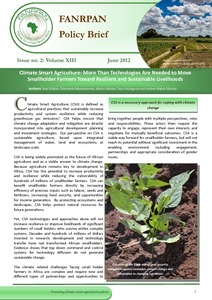Resource information
Climate Smart Agriculture (CSA) is defined as agricultural practices that sustainably increase productivity and system resilience while reducing greenhouse gas emissions1. CSA helps ensure that climate change adaptation and mitigation are directly incorporated into agricultural development planning and investment strategies. Our perspective on CSA is sustainable agriculture, based upon integrated management of water, land and ecosystems at landscape scale.
CSA is being widely promoted as the future of African agriculture and as a viable answer to climate change. Because agriculture remains key to development in Africa, CSA has the potential to increase productivity and resilience while reducing the vulnerability of hundreds of millions of smallholder farmers. CSA can benefit smallholder farmers directly by increasing efficiency of precious inputs such as labour, seeds and fertilizers, increasing food security, and opportunities for income generation. By protecting ecosystems and landscapes, CSA helps protect natural resources for future generations.
Yet, CSA technologies and approaches alone will not increase resilience or improve livelihoods of significant numbers of small holders who survive within complex systems. Decades and hundreds of millions of dollars invested in research, development and technology transfer have not transformed African smallholders. Evidence shows that top down command and control systems for technology diffusion do not generate sustainable change.


